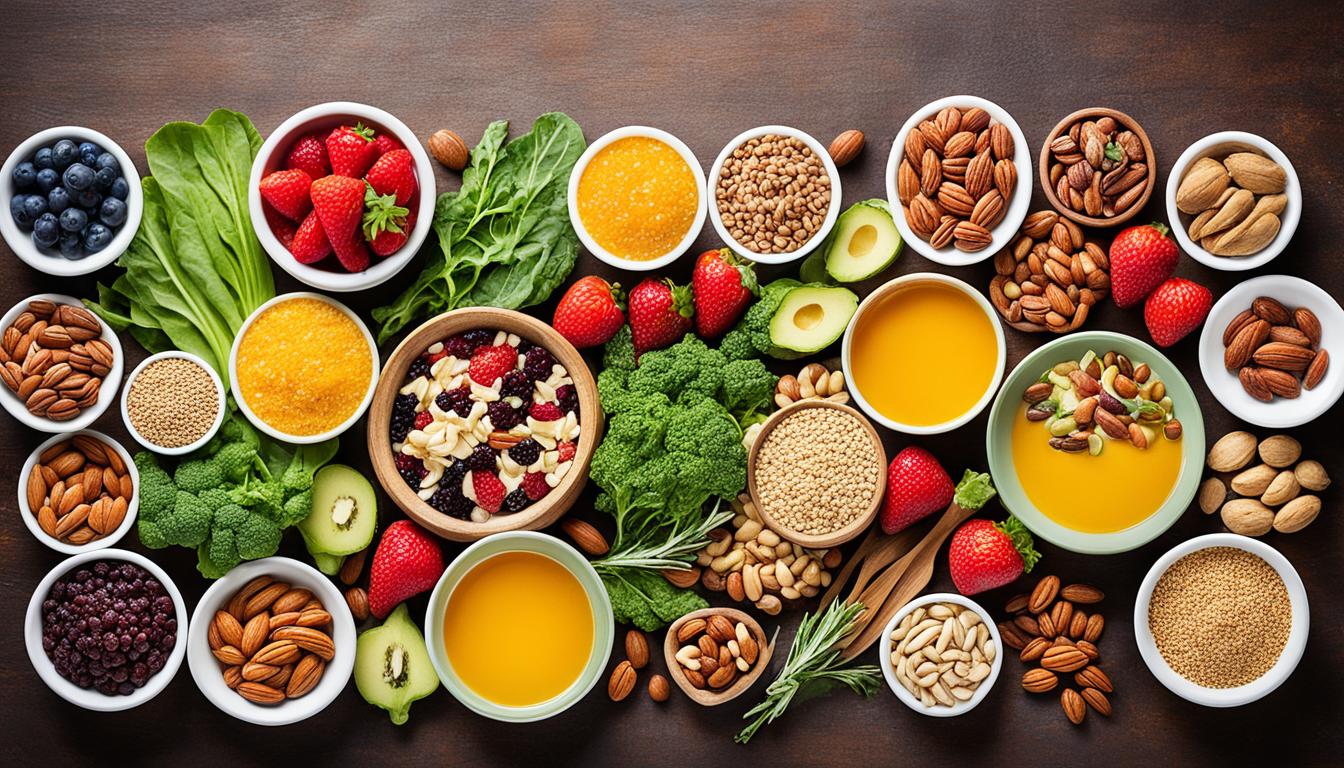Did you know that 70% of Americans report experiencing stress or anxiety daily? It’s clear that finding natural ways to reduce stress is key. Our diet can greatly help in managing anxiety and finding calm. Let’s dive into the world of stress-busting foods for a tasty way to improve your well-being.
What you eat can really help ease stress, just as much as other lifestyle changes. Leafy greens and fatty fish can make a big difference. They help manage anxiety and bring calm to your day. Let’s see how eating right can lead to a calmer, more peaceful life.
Key Takeaways
- 70% of Americans experience daily stress or anxiety.
- Diet significantly impacts mental well-being and stress management.
- Stress-busting foods can naturally enhance your mood and reduce stress.
- Incorporating specific nutrients helps achieve calm and balance.
- Exploring stress-reducing foods can offer a delicious path to well-being.
Introduction to Stress-Busting Foods
In today’s fast-paced world, more people are turning to foods to reduce stress. This approach is natural and enjoyable. It shows how dietary choices can affect mental health. By adding the best foods for stress relief to your diet, you can manage stress better.
Choosing foods for stress relief helps you satisfy your hunger and support your well-being. These foods are full of nutrients that balance your mood, lower anxiety, and help you feel calm.
Imagine eating something tasty and feeling your stress go away. That’s what stress-busting foods offer. Adding nuts, leafy greens, or fatty fish to your meals can really help you deal with daily stress.
It’s important to know about these foods to pick the best for your diet. This leads to a better and more balanced life. As you learn more about diet-based stress relief, you’ll find it easier to stay positive and healthy.
The Science Behind Stress-Reducing Foods
Food plays a big role in how we feel and manage stress. Some foods can really help by changing our mood and stress levels. They do this because of the nutrients they have.
How Food Affects Mood
When you eat foods that help reduce stress, your body makes chemicals that make you feel better. For example, foods high in magnesium can make your muscles relax and lower anxiety. Whole grains also release serotonin, which is a hormone that makes you feel calm and relaxed.
Omega-3 fatty acids, found in fatty fish, can lower cortisol levels. This hormone is linked to stress. So, eating foods with these acids can make you feel more balanced and less stressed.
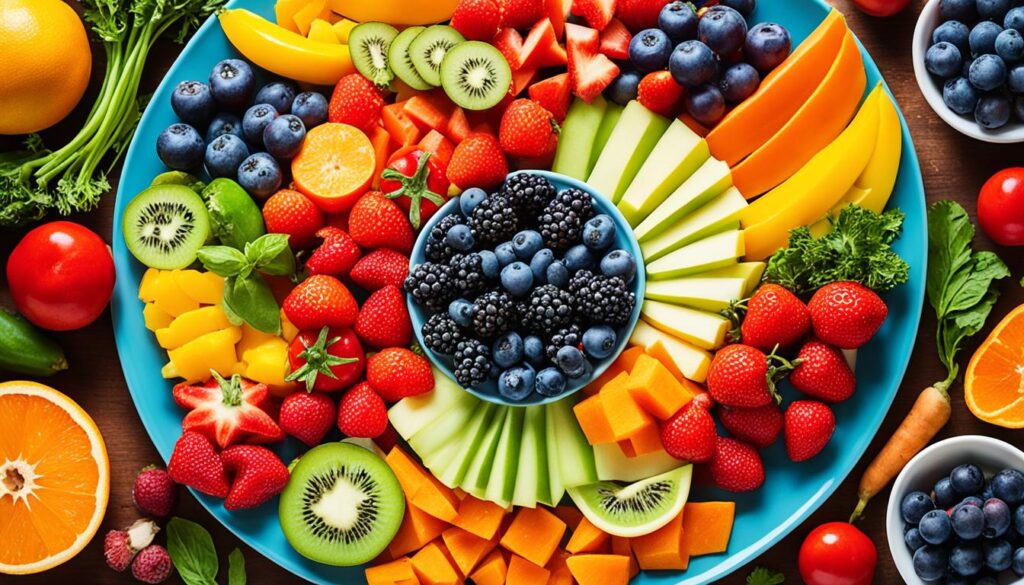
Nutrients That Combat Stress
Many nutrients are key to fighting stress. They help improve your mood and keep you healthy:
- Magnesium: Important for relaxing muscles and lowering anxiety.
- Omega-3 Fatty Acids: In fatty fish, these acids help reduce cortisol levels.
- Complex Carbohydrates: In whole grains, these carbs boost serotonin production.
- Antioxidants: In fruits and veggies, they fight stress and inflammation.
- B Vitamins: Vital for making energy and managing stress.
Eating these nutrients through stress-reducing foods can really help your mood and stress levels. This can lead to a healthier, more balanced life.
Top Stress-Relief Foods You Should Include in Your Diet
Choosing the right foods is key to managing stress. By adding certain foods to your diet, you can ease your nerves and boost your health. Let’s explore some top foods for stress relief.
Leafy Greens
Leafy greens like spinach, kale, and Swiss chard are full of nutrients. They have folate, which helps make neurotransmitters like serotonin and dopamine. Adding these greens to your meals is great for managing anxiety.
Fatty Fish
Fatty fish like salmon, mackerel, and sardines are rich in omega-3 fatty acids. These fats are vital for brain health and help reduce stress. Eating fatty fish often can lower anxiety, making it a top food for stress relief.
Nuts and Seeds
Nuts and seeds, such as almonds, walnuts, and chia seeds, are full of healthy fats and magnesium. Magnesium helps calm you down and control stress hormones. Adding nuts and seeds to your meals is a tasty way to relax and reduce anxiety.
The Role of Antioxidants in Stress Management
Antioxidants are key in fighting oxidative stress and helping the nervous system. They help you manage stress better. By adding stress-fighting foods to your diet, you can boost your health and wellbeing.
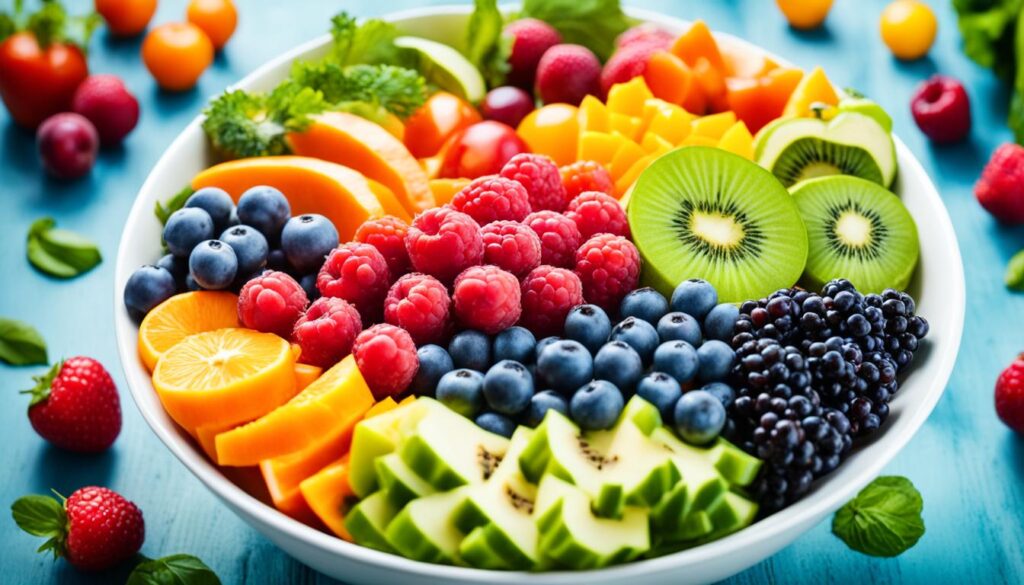
Rich Sources of Antioxidants
It’s vital to eat foods full of antioxidants to handle stress well. Some top antioxidant sources are:
- Blueberries
- Dark Chocolate
- Nuts and Seeds
- Leafy Greens
- Green Tea
These foods not only taste great but also fight oxidative stress effectively.
Antioxidant-Rich Recipes
Adding antioxidant-rich recipes to your meals can help you fight stress better. Here are some simple and tasty ideas:
- Blueberry Spinach Smoothie: Blend 1 cup of spinach, 1 cup of blueberries, a banana, and a cup of almond milk. Add honey to taste.
- Dark Chocolate Almond Bark: Melt dark chocolate and mix in a handful of almonds. Spread onto a baking sheet and refrigerate until hard.
- Green Tea with Lemon: Brew a cup of green tea and add a slice of lemon for an extra boost of antioxidants.
By using these antioxidant-rich recipes daily, you can enjoy the stress-fighting benefits. This supports your body’s stress management.
Foods to Reduce Stress
Eating healthy foods is a great way to handle stress. Adding certain foods to your diet can really help lower stress and improve your mood. Here are some foods that can help you feel less stressed:
Adding stress-relieving foods to your meals can change your life. Making smart food choices helps you stay calm and strong. Let’s explore some top foods for stress relief:
| Food | Benefits | Key Nutrients |
|---|---|---|
| Avocados | Rich in healthy fats and fiber, avocados support brain health. | Vitamin B6, Magnesium, Folate |
| Blueberries | Loaded with antioxidants, these berries help combat oxidative stress. | Vitamin C, Vitamin K, Manganese |
| Chamomile Tea | Known for its calming properties, it assists in reducing anxiety. | Apigenin, Antioxidants |
| Sweet Potatoes | Provides a nutritious, comforting alternative to refined carbs. | Beta-Carotene, Vitamin C, Fiber |
| Yogurt | Probiotic-rich yogurt improves gut health, which is linked to emotional well-being. | Probiotics, Calcium, Vitamin B12 |
What you eat is key to managing stress. These foods are full of nutrients that help your body and mind. Eating a mix of these foods is a great way to keep your stress levels down.
Comfort Foods That Are Good for You
Comfort foods are often seen as unhealthy, but some can be good for your health. Let’s look at some healthy comfort foods and how they help with stress.
Dark Chocolate
Dark chocolate is a top choice for healthy comfort foods. It’s full of antioxidants. These help lower stress hormones in your body. Plus, it boosts serotonin, making you feel happier and less anxious.
Oats and Whole Grains
Oats and whole grains are great for managing stress. They have complex carbs that give you steady energy and help make serotonin. Adding these to your meals can make you feel better and less anxious.
Herbal Teas
Herbal teas like chamomile and lavender are great for calming down. Herbal teas for calm can help you relax after a tough day. They’re also good for staying hydrated and making bedtime routine better.
| Comfort Food | Benefit | Key Components |
|---|---|---|
| Dark Chocolate | Stress Relief | Antioxidants, Serotonin Boosting |
| Whole Grains | Anxiety Reduction | Complex Carbohydrates, Serotonin Production |
| Herbal Teas | Calm | Relaxing Herbs |
How to Incorporate Stress-Busting Foods into Your Daily Routine
Adding stress-busting foods to your daily meals can greatly improve your well-being. By planning your meals and choosing smart snacks, you can follow a diet that helps reduce stress. Here are some easy steps to help you.
Simple Meal Ideas
Planning your meals is key to eating stress-relieving foods. Start with a nutritious breakfast. Try oatmeal with fresh berries and nuts. This meal is filling and packed with antioxidants and healthy fats for stress relief.
For lunch, go for a salad with spinach or kale. Add grilled salmon, omega-3 fatty acids, and veggies like bell peppers and avocados. This meal keeps you energized and lowers stress.
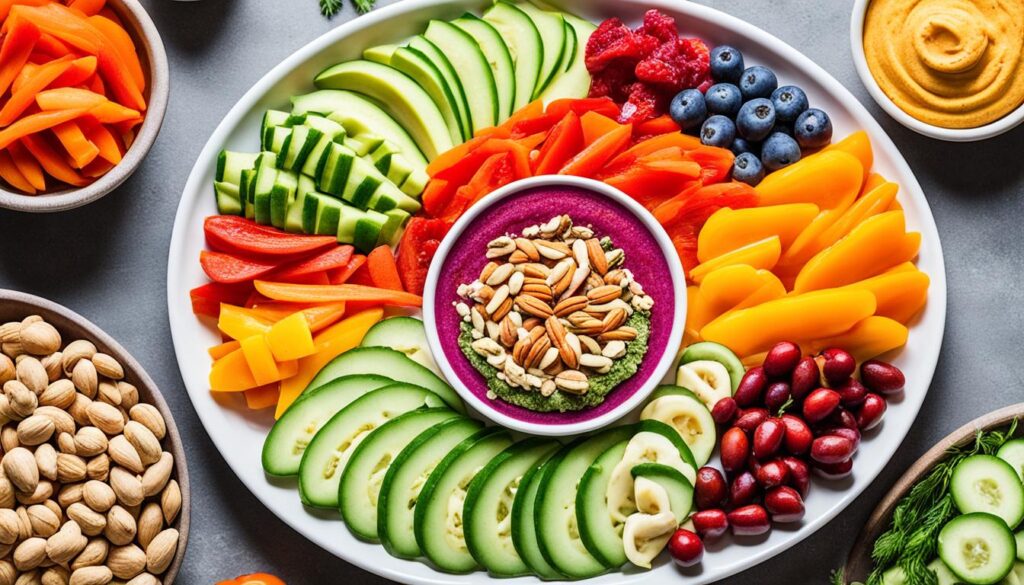
For dinner, consider a quinoa bowl with roasted veggies and sautéed greens. These foods are great for reducing stress and can be made quickly, even on busy days.
Snacking Smart
Snacks are a chance to add stress-busting foods to your day. Opt for mixed nuts and seeds instead of chips or candy. They’re full of healthy fats, protein, and fiber to help manage stress.
Yogurt with honey and fresh fruit is another great snack. It’s tasty and gives you probiotics and natural sugars to lift your mood.
Don’t forget about prepping snacks for your stress relief diet plan. Cut up raw veggies like carrots and cucumbers and keep them in the fridge. Enjoy them with hummus for a nutritious snack.
These meal and snack ideas can easily fit into your daily life, helping you feel less stressed. The important thing is to be consistent and enjoy the foods that help you feel good.
Common Myths About Dietary Stress Relief
There are many myths about stress and diet that can lead you astray. Understanding the truth can help you make better choices. Let’s look at some common myths about stress and diet:
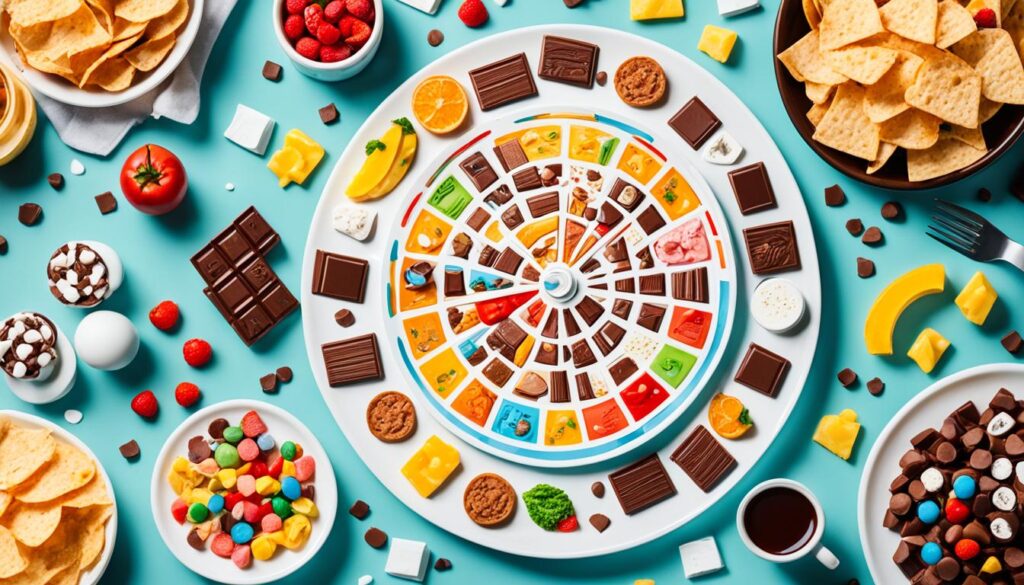
Myth 1: Comfort foods have to be unhealthy. Many think comfort foods are always bad for you because they’re full of sugar and fat. But, foods like oatmeal, yogurt, and dark chocolate can be both tasty and good for you. They can even help reduce stress.
Myth 2: Supplements can replace the benefits of whole foods. Some people think supplements are as good as eating a balanced diet. But, whole foods have a mix of nutrients and fibers that supplements can’t match.
Myth 3: Eating more will alleviate stress. It might seem like eating more can help when you’re stressed, but it can actually cause more stress and health problems. Instead, eat mindfully and choose foods that are good for you to fight stress.
Knowing the truth about stress and diet helps you make smarter food choices. It leads to real stress relief. Stay informed to make better food choices.
“Let food be thy medicine and medicine be thy food.” — Hippocrates
It’s important to know the facts to manage stress with diet. By understanding these myths, you can pick foods that are good for you.
Foods to Avoid When Managing Stress
Some foods help reduce stress, but others can make it worse. It’s important to know which ones to avoid to help manage stress better.
High-Sugar Foods
It’s key to understand how sugar affects stress. Foods high in sugar cause your blood sugar to go up and then down quickly. This can make you feel anxious and irritable.
This can mess with your body’s stress response, making it hard to stay calm. You might feel more stressed out.
Also, the energy from sugar doesn’t last long. You might end up wanting more sugary foods, which can be a vicious cycle. To avoid this, try eating fruits or nuts instead. They give you energy without the sugar crash.
Caffeine and Alcohol
Caffeine and alcohol are often overlooked when talking about foods to avoid for anxiety. Caffeine can make your nervous system more active, raising stress hormones. This can make you feel jittery and more stressed.
Alcohol might seem to relax you at first but can mess with your sleep and increase anxiety the next day. Together, these effects can make it hard for your body to handle stress. Cutting down on caffeine and alcohol can help you stay balanced and less stressed.
Conclusion
Eating right can really help you handle stress better. Foods like leafy greens, fatty fish, and nuts and seeds are full of nutrients that fight stress. Adding these foods to your meals can naturally help your mental health.
Antioxidants are key in fighting stress too. Eating foods high in antioxidants can reduce stress on your body. Adding dark chocolate, oats, and herbal teas to your diet can make a big difference. Even choosing healthier snacks can improve your well-being.
Knowing how food affects you can help you make better choices. By focusing on foods that reduce stress, you’re on your way to a healthier life. Remember, eating mindfully is the first step to managing stress. Here’s to a healthier and stress-free future!

